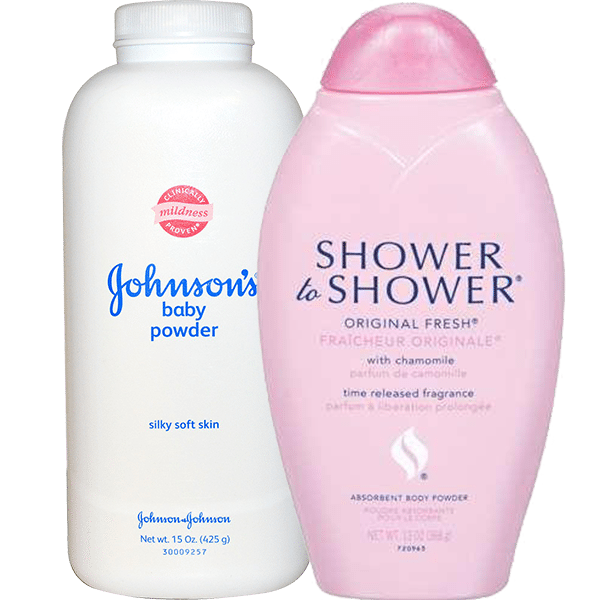OVARIAN CANCER FROM TALCUM POWDER
Research dating as far back as 1971 links talcum powder to ovarian cancer, when scientists in Wales discovered particles of talc in ovarian and cervical tumors.
Now, thousands of lawsuits are pending against Johnson & Johnson claiming that their Baby Powder products caused ovarian cancer.
Get A Free ConsultationStudies Linking Talcum Powder to Ovarian Cancer
Free Lawsuit Evaluation
The use of this contact form does not create an attorney-client relationship and is for informational purposes to determine if you have a valid case. For more information or to speak directly with an attorney, please contact us at 1-215-923-9300.
There is a substantial amount of scientific data that supports the argument that talcum powder can cause ovarian cancer. Numerous studies have linked talcum powder use in the genital areas to ovarian cancer, yet this information has never been disclosed by the manufacturers of the popular Baby Powder and Shower to Shower products.
One study from May 2016 analyzed a population of African-American women, and showed that genital use of talcum powder is linked with a 44 percent increase in invasive ovarian cancer.
A study in 1982 at Harvard University compared 215 women with ovarian cancer and 215 healthy women. The women who used talcum powder were at nearly twice the risk of developing ovarian cancer, and women who used talc in the genital region had a risk that was nearly three times as great.
There have been at least 10 studies that have shown similar results. Only a small number of studies showed that talc did not increase the risk.
After combining all of the data from over 20,000 women across many different studies, it was found that talcum powder use contribute to a 24 percent increased risk in ovarian cancer.
How does Talcum Powder Cause Ovarian Cancer?
Talc is listed as a possible human carcinogen by the International Agency for Research on Cancer. In 2006, the agency listed that talc can cause cancer if used in the female genital area.
It is difficult to determine exactly how the talc causes cancer, but there have been numerous biopsies that show talc can travel to the ovaries, embedding particles of talc that can lead to cancerous tumors.
Studies have shown that talc crystals can move up into the ovaries, and several pathology reports confirmed that talc crystals were found in the ovaries of patients with ovarian cancer.
More research is needed to determine exactly how talc causes ovarian cancer, but there is sufficient data that most in the medical community agree that the risk is significant enough to warrant warnings on products that contain talc.
Causes of cancer are hard to study, because cancer develops over a long period of time with many different possible factors. However, the fact is that studies have shown that women who regularly use talcum powder in the genital area have a higher likelihood of developing ovarian cancer.
No Warnings Provided by Johnson and Johnson
Johnson and Johnson has been aware of the possible risk for decades, yet has not informed the users of the products about the possible link to ovarian cancer.
Talcum powder products have been used for decades to prevent odor, moisture, and chafing. They had been applied directly to the genital area, on underwear, sanitary napkins, and tampons.
Johnson & Johnson still claims that their products are safe, arguing that the research that implicates talc and ovarian cancer is flawed. They have never provided any warnings on their products and continue to market products containing talcum powder to women for perennial use.
Even the suppliers of talcum powder have warning labels, but Johnson & Johnson refuses to add warnings to their products, fearing that it will negatively impact sales of the highly successful product.
Petitions For Warning Labels have Been Denied
Since the research emerged about ovarian cancer and talcum powder, several petitions were made to add warning labels to popular products containing talcum powder.
The Cancer Prevention Coalition asked the FDA in 1994 to add warning labels and was denied. They asked again in 2008 and were denied again. The FDA said there was “no conclusive evidence”, although it was possible that talc may cause cancer.
Lawsuits for Ovarian Cancer from Talcum Powder
This year, several juries found Johnson & Johnson guilty of covering up the risks of their talcum powder products, and judges have awarded multi million dollar verdict to victims of ovarian cancer.
There are thousands of more women who have developed ovarian cancer that may be linked to talcum powder.
We are actively investigating lawsuits for individuals who developed ovarian cancer after using talcum powder for feminine hygiene. Our team of female attorneys will help answer your questions at no cost, and there is no obligation to pursue a lawsuit. If you have any questions at all, don’t hesitate to contact our talcum powder lawyers today.
Talk to a Lawyer
Are you interested in filing a PPI Lawsuit? Get a free consultation today.

